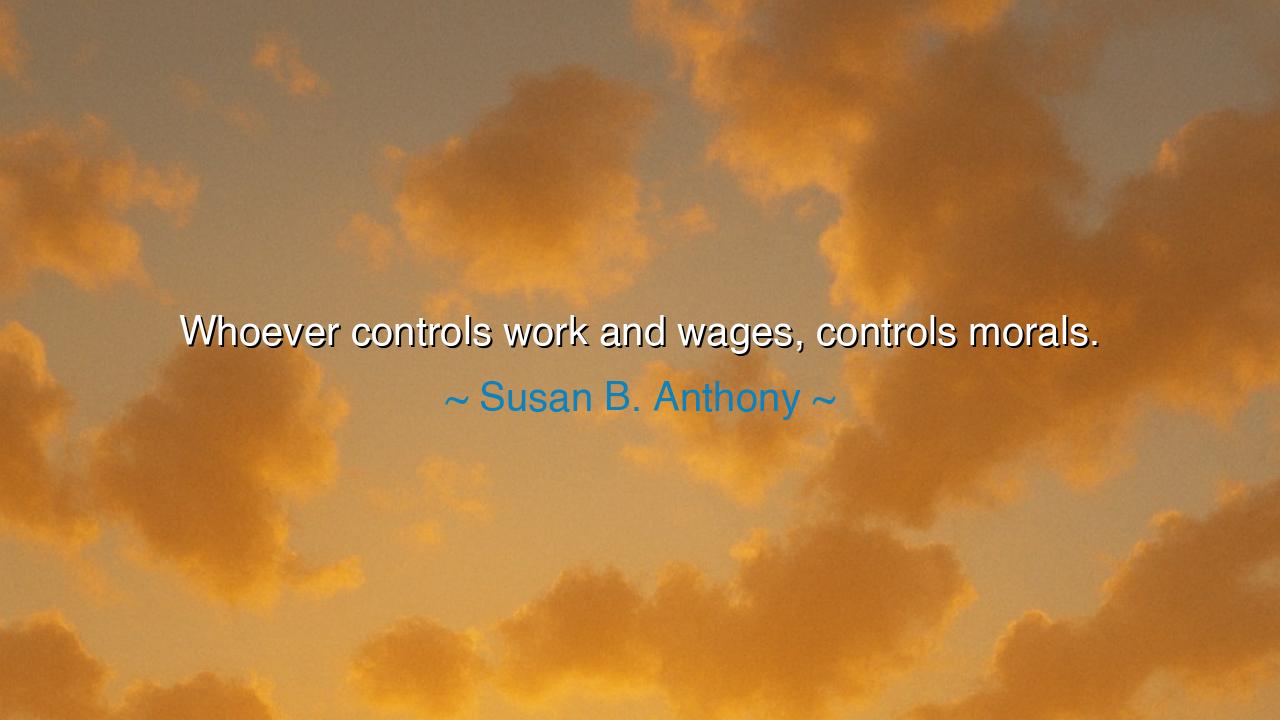
Whoever controls work and wages, controls morals.






The words of Susan B. Anthony, “Whoever controls work and wages, controls morals,” strike with the weight of truth forged in struggle. She reveals that the power to command labor and its reward is also the power to shape human conduct, for necessity bends the will of even the strongest. Where one’s bread comes from, there too lies the pressure to conform, obey, and yield. Thus, the mastery over work and wages becomes mastery over conscience itself.
At the heart of this saying lies the recognition that freedom is inseparable from economic independence. When one’s survival rests in the hands of another, one’s morals—the choices of right and wrong—are often bound by chains unseen. A just society cannot exist where wages are tools of control, for integrity withers when men and women must betray themselves to eat. Anthony’s warning is timeless: liberty demands not only the right to speak, but the right to labor fairly and live with dignity.
The origin of these words springs from Anthony’s tireless fight for women’s rights and social justice in the nineteenth century. She witnessed how unequal control of work condemned women to dependency, and how unjust wages silenced their voices. By speaking so, she exposed the deeper battle—that political freedom without economic power is hollow. Her cry was not only for equality in law, but for equality in livelihood, that morals might remain unbent by hunger or oppression.
Let this teaching endure: that to honor human dignity, work must be free, and wages must be just. A society that corrupts these will also corrupt the morals of its people, forcing them to serve not truth but survival. Anthony’s words stand as a beacon, reminding generations that justice is not only written in laws, but lived in the fairness of labor and the independence it grants. Only then can virtue stand unshaken.






LKle khanh
Susan B. Anthony’s quote resonates with the idea that economic systems shape more than just material wealth—they influence societal morals. If those who control wages hold the power to control values, does that mean we need to rethink how we structure the economy? How might providing fair wages and job security lead to a stronger, more ethical society? Shouldn't the value of work and fair compensation be seen as a moral issue itself?
TTHa Thi Thanh Thao
I find it intriguing how Anthony’s words highlight the relationship between work, wages, and morality. It suggests that when people are financially oppressed or struggling, it impacts their ability to act ethically or feel motivated. Is this the reason why we sometimes see moral compromise among those in poverty? How can society address this so that people aren’t forced into situations where they have to choose between survival and their morals?
KSKhen Son
This quote strikes me as a deep reflection on how economic power impacts social structures. If the control of wages dictates morals, does that mean the rich or those in charge of wages have more power over shaping the values of society? Can this be seen in today's world, where there is often a disconnect between the wealthy and those working minimum wage jobs? How does this affect how people view each other?
QAQuynh Anh
Susan B. Anthony’s quote is powerful, and it makes me think about the broader implications of economic control. If work and wages truly influence morals, then how do unequal wages or job insecurity shape societal values? Does this mean that economic inequality can lead to moral decay or undermine a sense of community? What does this say about the responsibility of employers and governments in ensuring fair wages for all?